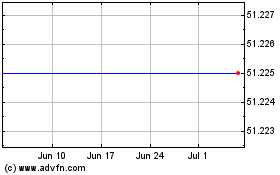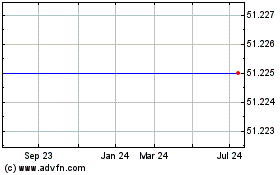Altin AG Holding(s) in Company
October 15 2015 - 12:30PM
UK Regulatory
TIDMAIA
ALTIN market review and portfolio holdings as of 1st October
2015
Baar, 15 October 2015 - ALTIN AG (SIX: ALTN, LSE: AIA), the
Swiss alternative investment company listed on the London and Swiss
stock exchanges, today discloses its entire hedge fund portfolio
holdings as part of its policy of full transparency to investors.
The portfolio, featuring more than 40 underlying hedge funds, is
particularly well diversified and has a NAV performance of
+211.70%1 since its inception in December 1996.
ALTIN continues to deliver solid outperformance
After the +8.60% share price appreciation in 2014, the positive
share price trend continued in 2015, with ALTIN shares rising by a
further +13.63% by the end of September. Over the same period, the
share price discount to NAV has fallen significantly since the
beginning of 2015, reducing from 21.8% to 12.1%. In the year to end
September the NAV is up +1.06% (estimated). Thanks to the permanent
capital base provided by its structure, the ALTIN portfolio can be
allocated to funds that require a slightly longer lock-up but offer
potentially higher returns, without incurring any liquidity
mismatch. The portfolio remains however highly liquid, with 62.06%
of assets invested in funds with monthly or better liquidity,
allowing the manager to make allocation shifts when deemed
necessary.
Portfolio as at 1st October 2015 Total Portfolio (%)
Macro 29.04%
Cumulus Fund Leveraged 2.49%
Finisterre Global Opportunity Fund 3.20%
Fortress Macro Fund Ltd 2.40%
Goldfinch Capital Management Offshore Ltd 2.29%
H2O Vivace 3.25%
Quantica Managed Futures Fund Inc 2.84%
Stone Milliner Macro Fund Inc 3.56%
The Tudor BVI Global Fund Ltd 2.90%
Two Sigma Compass Enhanced Cayman Fund Ltd 6.11%
Equity Hedge 22.46%
Arrow Offshore Ltd 2.10%
Clearline Capital Partners Offshore Ltd 3.21%
Coatue Offshore Fund Ltd 3.87%
DB Platinum Ivory Optimal Fund 1.66%
NPJ Global Opportunities Fund 3.00%
Passport Long Short Fund 1.02%
Verrazzano European Focus Fund PLC 4.56%
Zeal China Fund Limited 3.04%
Event Driven 28.35%
Aristeia International Ltd 3.77%
Contrarian Emerging Markets Offshore Fund Ltd 3.92%
Jana Nirvana Offshore Fund Ltd 4.88%
LLSOF LP 2.18%
Merrill Lynch Investment Solutions - Castlerigg 1.33%
Equity Event and Arbitrage UCITS Fund
Marathon Special Opportunity Fund Ltd 4.78%
Paulson Enhanced Ltd 3.03%
York European Focus Unit Trust 4.46%
Relative Value 40.89%
Acadian Global Leveraged Market Neutral Equity UCITS 3.26%
Atlas Enhanced Fund Ltd 2.97%
Capstone Vol Offshore Ltd 2.99%
Citadel Kensington Global Strategies Fund Ltd 6.46%
Claren Road Credit Fund Ltd 1.26%
Millennium International 4.44%
Providence MBS Fund Ltd 3.96%
Stratus Feeder Ltd 4.46%
Two Sigma Absolute Return Equity 3.02%
Enhanced Cayman Fund Ltd
Visium Balanced Offshore Fund Ltd 3.13%
ZP Offshore Utility Fund Ltd 4.94%
Protection 5.23%
Conquest Macro Fund Ltd 1.13%
Fortress Convex Asia Fund Ltd 2.09%
TailProtect Ltd 2.01%
Special Investments 1.07%
ALTIN AG 1.41%
Total 128.45%2
ALTIN: Q3 2015 commentary
ALTIN's portfolio was down for the quarter under review, albeit
in a relatively benign fashion in light of the meaningful setbacks
experienced by financial markets. From a global perspective the
third quarter of this year was the worst in four years for risky
assets. During the period, concerns on global growth gained
momentum due to a combination of a Chinese slowdown, a recession in
Brazil and related weaknesses in commodity prices. Risk aversion
escalated in late September when the Federal Reserve delayed hiking
rates in a move that should have supported equity markets, but
instead fuelled more fears over the outlook for international
growth. With regards to the portfolio, there has been a significant
dispersion of returns across styles, with roughly equal positive
contributions from Relative Value, Macro and Protection almost
entirely offsetting the nearly identical negative contributions
from Equity Hedge and Even Driven. Most importantly, ALTIN's
portfolio remains positive year-to-date and well positioned to
generate good risk-adjusted returns irrespective of future market
direction.
The Macro silo witnessed significant dispersion across
discretionary and systematic funds, but also and more importantly,
across styles and trading time horizons. Naturally, long equity
positioning, which was a common trade across managers, was
detrimental to performance, whilst long bonds and short commodities
were the winning trades for the quarter. In terms of trading style,
medium-term trend-following strategies suffered heavily at the
beginning of the quarter, only recovering losses at the end of
September on the back of the rally in government bonds. On the
other hand, fundamental value-type positions as well as
shorter-term trading styles, especially when implemented in a
diversified and robust portfolio construction framework, managed to
limit losses or even to be positive, sometimes quite significantly
so.
Equity Hedge managers were nearly all down, with the exception
of a technology specialist, as virtually no area across the globe
was immune to the quarter's sell-off. That being said, managers
entered the quarter with typically larger short books than they had
had at the beginning of the year. In the US, Equity Hedge managers
were exposed to growth stocks, which suffered the most during the
market downturn, while utilities and staples held up well, but were
relatively underweighted in managers' portfolios. European managers
fared better across this adverse environment because of a more
variable exposure to equity beta and a more defensive positioning
overall. Whilst this hampered returns in the first half of the
year, it provided significant downside protection in the third
quarter. Elsewhere, the allocation to Asia was the worst performer
as Chinese equities suffered a very sharp quarterly decline after
being a strong positive contributor to performance earlier in the
year. However, it is worth noting that the Chinese manager in the
portfolio remains positive year-to-date.
Almost all Event Driven managers were down during the quarter,
with the notable exception of an emerging market distressed fund.
In the equity space, the bulk of the negative performance came from
special situations books, where losses were not only stock
specific, but also due to broad market moves. Risk-arbitrage books
withstood the correction better, but higher volatility levels
pushed some merger spreads to widen dramatically over the period.
In addition, M&A in the healthcare sector (which had been a
strong contributor to performance for Event-Driven funds until
recently) saw adverse developments triggered by Hilary Clinton's
comments on curbing drug prices. This particularly impacted a
handful of crowded healthcare stocks. The semi-conductor sector was
also under pressure due to macro concerns, but in that sector
managers see the pull back as creating more value going forward. In
credit markets, dynamics are starting to shift, as the ending of
ample liquidity is threatening companies with poor fundamentals.
When combined with a slump in energy prices, this led the
allocation to distressed energy companies to be one of the largest
performance detractors. However, despite all those headwinds, many
Event Driven managers took the opportunity during a sometimes
indiscriminate sell-off to add to their strongest convictions.
Within Relative Value most managers were positive, with the best
performers being a systematic multi-strategy fund and a
quantitative equity market neutral fund. Interestingly, the market
dynamic during the period seemed to be triggered by asset
allocators, and possibly quantitative directional strategies,
rather than by some hedge fund deleveraging event. This is clear
when looking at equity market factors (momentum, size, etc.), which
were relatively immune or even positive during the quarter. It
explains the good performance of market neutral strategies and, if
necessary, underlines their diversification benefits.
The good performance of multi-manager platforms is also a
testament of their risk management ability, especially with keeping
their sometimes highly levered portfolios unexposed to broad market
shifts. Aside from equity strategies, volatility and fixed income
arbitrage funds also managed to produce positive returns, as the
long-awaited pick-up in volatility and dispersion finally reached
these markets.
(MORE TO FOLLOW) Dow Jones Newswires
October 15, 2015 12:30 ET (16:30 GMT)
Altin Reg (LSE:AIA)
Historical Stock Chart
From Feb 2025 to Mar 2025

Altin Reg (LSE:AIA)
Historical Stock Chart
From Mar 2024 to Mar 2025
